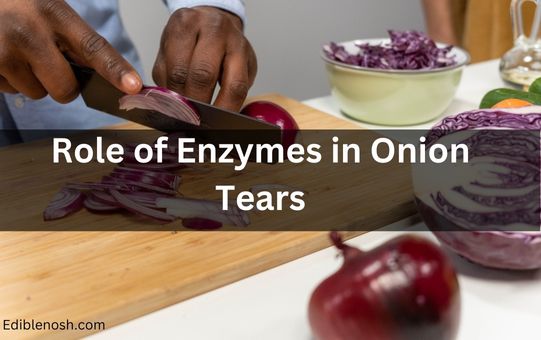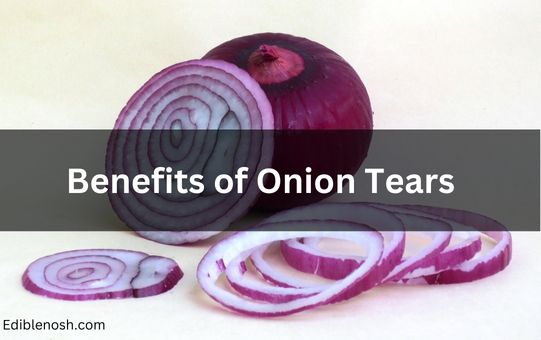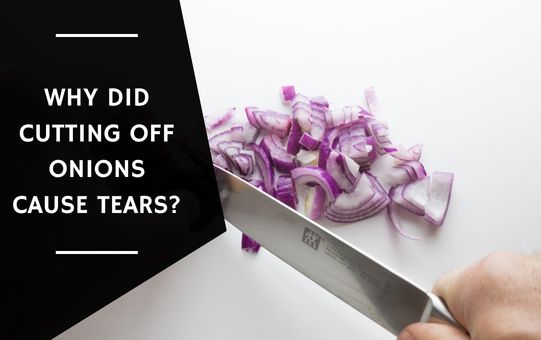Raw onions produce tears and discomfort, as is common knowledge. But why did cutting off onions cause tears?
When the onion is chopped, it releases a molecule known as syn-propanediol-S-oxide, which combines with the water in our eyes to form sulfuric acid, resulting in discomfort and tears. Histamines released in response to the chemical may also contribute to the sobbing response.
This essay will discuss the numerous elements that contribute to this experience, as well as techniques to decrease or eliminate tears when chopping onions.
Contents
The Science of Onion Tears
So, what exactly is going on when we cut an onion and end up in tears? To understand this, it’s important to know a little bit about the structure of an onion.
Onions are made up of layers of cells, which contain various chemicals, including a substance called syn-propanediol-S-oxide. When an onion is cut, the cells are broken, releasing this chemical into the air. When it comes into contact with the water in our eyes, it creates sulfuric acid, which irritates the eyes and leads to the production of tears.
But that’s not the only reason for onion tears. As the syn-propanediol-S-oxide is released into the air, it also triggers the production of histamines in our eyes. Histamines are chemicals that are released in response to an allergen or irritant, and they can cause swelling, itching, and increased mucus production – all of which contribute to the crying response.
Read Also: Why Do Chefs Crack An Onion Before Eating?
The Role of Enzymes in Onion Tears
In addition to the chemical reactions that take place when an onion is cut, there is also a role played by enzymes in the onion itself.
Onions contain a group of enzymes called lachrymatory-factor synthases, which are responsible for the synthesis of the syn-propanediol-S-oxide mentioned earlier. When these enzymes are activated, either by cutting or bruising the onion, they produce the chemical that leads to the production of tears.
Interestingly, the concentration of these enzymes varies from one onion to another, which is why some people may be more prone to tearing up while cutting certain types of onions than others.

Tips for Reducing Onion Tears
Now that we understand the science behind onion tears, let’s explore some ways to reduce or eliminate the crying response while cutting onions.
One of the most effective ways to reduce onion tears is to use a sharp knife. A sharp blade will cleanly cut through the onion’s cells, releasing fewer of the irritant chemicals into the air. On the other hand, a dull knife will crush the cells, leading to the release of more tear-inducing substances.
Another tip is to cut the onion under cold running water or to rinse it off after it has been cut. This can help to wash away some of the irritant chemicals and reduce the amount that comes into contact with your eyes.
You can also try cutting the onion near a fan or using a candle to help dissipate the chemicals. Some people find that wearing goggles or using special onion-cutting glasses can also be helpful in reducing tears.
Finally, it’s worth noting that the strength of the “tear response” can vary depending on the type of onion you are using. For example, sweet onions and yellow onions tend to produce fewer tears than white or red onions. So, if you are particularly sensitive to onion tears, you may want to try using a milder variety.
The Benefits of Onion Tears
Despite the inconvenience of onion tears, there may be some benefits to this phenomenon. For one thing, the irritation caused by the chemicals in onions can actually help to clear congestion and improve breathing.
In addition, the sulfur compounds that are released when an onion is cut have been shown to have antimicrobial properties, which means they may help to kill off harmful bacteria. This could potentially make onions a natural way to boost immune function and protect against illness.
Finally, some people believe that onion tears are a sign of the onion’s quality. The theory is that the stronger the “tear response,” the fresher and more pungent the onion is likely to be. While there is no scientific evidence to support this claim, it’s worth noting that onions do contain a higher concentration of nutrients when they are fresher.

Onions in World Culture and Cuisine
Despite the tears they may cause, onions are a staple ingredient in many cuisines around the world. From French onion soup to Indian curry, onions add flavor, depth, and nutrition to a wide variety of dishes.
In many cultures, onions have also been used for medicinal purposes and have been associated with a range of health benefits. For example, in ancient Egypt, onions were believed to have the power to cure a variety of ailments, including insomnia, headache, and even hair loss.
Today, onions continue to be a popular and versatile ingredient in kitchens around the world, and their unique ability to cause tears is just one of the many things that make them so special.
Read Also: Why Do Brahmins Don’t Eat Onions?
Conclusion
As it turns out, the tears caused by cutting onions are the result of a complex chemical and enzymatic process. While they can be annoying, there may also be some benefits to this phenomenon, including the potential to boost immune function and kill harmful bacteria.
So next time you find yourself in tears while cutting onions, just remember that you’re experiencing a natural and fascinating scientific process. And with a few simple tips and techniques, you can minimize the tears and enjoy all the flavor and nutrition that onions have to offer.
FAQs | Why Cutting of Onions Causes Tears
Here are a few FAQs related to why cutting onions causes tears:
Why Do Onions Make Us Cry?
When an onion is cut, it releases a chemical called syn-propanediol-S-oxide which reacts with the water in our eyes to create sulfuric acid, causing irritation and tears. The release of histamines in response to the chemical can also contribute to the crying response.
Can Onions Cause Allergy Symptoms?
Onions can cause allergy symptoms in some people due to the release of histamines when the onion is cut. Symptoms may include swelling, itching, and increased mucus production.
Is There A Way To Prevent Tears While Cutting Onions?
Some tips for reducing onion tears include using a sharp knife, cutting the onion under cold running water, rinsing the onion after cutting, cutting the onion near a fan or candle, wearing goggles or special onion-cutting glasses, and using sweet or yellow onions which tend to produce fewer tears than white or red onions.
Are There Any Benefits To Onion Tears?
The irritation caused by onions may help to clear congestion and improve breathing, and the sulfur compounds released when an onion is cut have antimicrobial properties which may help to kill harmful bacteria and boost immune function.
Some people also believe that onion tears are a sign of the onion’s quality and freshness.
How Do Onions Figure Into World Culture And Cuisine?
Onions are a staple ingredient in many cuisines around the world and are used to add flavor, depth, and nutrition to a wide variety of dishes. In some cultures, onions have also been used for medicinal purposes and have been associated with a range of health benefits.
Despite the tears they may cause, onions are highly valued and widely used in the kitchen.

